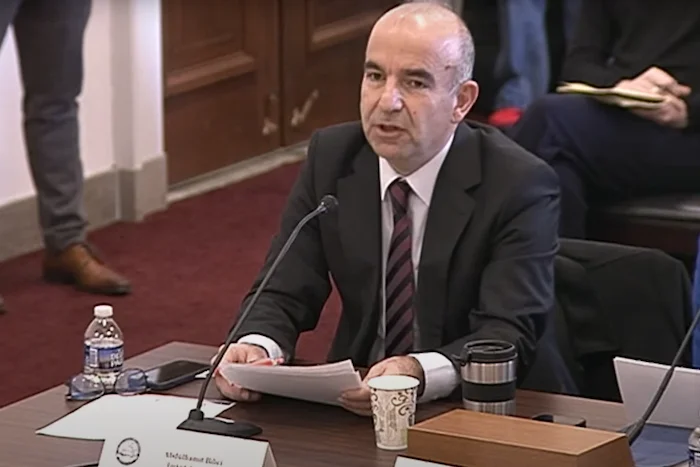Abdülhamit Bilici, the former editor-in-chief of the now-closed Zaman daily, has given a testimony on the Turkish government’s transnational repression at a congressional hearing in Washington, D.C., the Stockholm Center for Freedom reported
Held by the Tom Lantos Human Rights Commission on Thursday, the hearing, titled “Transnational Repression and the U.S. Response,” featured a panel of civil society experts and witnesses who detailed the practice of transnational repression originating from several countries, most notably Turkey and China.
“I personally experienced both national and transnational repression as a journalist,” Bilici said, talking about the government takeover of Zaman and his subsequent move to the US, where he now lives.
He then revealed that the organizers of a World Affairs Council event in Dayton, Ohio, were threatened by a US-based supporter of Turkish President Recep Tayyip Erdoğan due to his attendance.
“My hosts were brave enough not to cancel the event, but I had to travel under police protection,” he said. “And this is happening on American soil.”
“What I am sure [about] is that my case is not unique and not the worst. President Erdoğan’s long arm has reached tens of thousands of Turkish citizens abroad while Turkey has been experiencing a deepening human rights crisis, especially since the coup attempt in 2016,” Bilici said, referring to an abortive putsch that unleashed a widespread government crackdown on dissent.
Bilici highlighted an incident in Washington, D.C., where Erdoğan’s security detail had assaulted protesters and “got away with it.”
He also cited the US State Department’s annual human rights report on Turkey which included a reference to the Turkish government’s worldwide campaign over the past eight years to ensure the rendition of more than 100 citizens, often through cooperation with authoritarian states.
“Turkey’s campaign has targeted all dissidents with liberal, leftist [or] Kurdish backgrounds and especially people affiliated with the Hizmet or Gülen movement,” the journalist said.
He then went on to cite specific cases involving alleged Gülen movement members, such as former teachers Selahattin Gülen and Orhan İnandı, who were abducted by Turkish intelligence from Kenya and Kyrgyzstan, respectively.
“They published photos of Mr. İnandı with his broken arm through Turkish media, proudly showing that to the world,” he said.
“Most recently, they abducted Koray Vural, who was a businessman in Tajikistan.”
Bilici described abusive practices specifically targeting journalists living in exile, such as the pro-government Sabah daily’s publication of secretly taken photos of journalists living in Sweden that sometimes revealed the victims’ home addresses in the Nordic country, which hosts a sizeable Turkish expatriate community.
The pressure on the Sweden-based journalists came amid Turkey’s diplomatic pressure on Stockholm to extradite a number of government critics in return for Ankara’s approval of its bid to become a member of NATO.
Bilici also mentioned cases where dissident journalists suffered physical attacks, such as Ahmet Dönmez in Sweden and Erk Acarer in Germany.
He called on US authorities to implement the Global Magnitsky Act, a 2012 bipartisan piece of legislation authorizing the US government to impose personal sanctions on foreign government officials responsible for human rights abuses.
He also pointed out the crucial role played by exiled journalists in providing alternatives to the government narrative through social media, calling on US authorities to exert pressure on the platforms so that they do not comply with the requests of authoritarian governments.
“We are talking about a country which is a member of NATO, and it is a shame that a NATO country is among the leading actors of national and transnational repression,” he said.
“I think different standards for allies and [hostile nations] reduce the power of the message of democracy,” he said. “When Putin kidnaps a dissident or jails a journalist, you speak loudly. But when you keep quiet when your ally, Turkey, does it, what will be the impression you are giving to the world?”
From spying through diplomatic missions and pro-government diaspora organizations to the denial of consular services and outright intimidation and illegal renditions, the Turkish government has been using a wide range of tactics against its critics overseas.
The government’s campaign has mostly relied on renditions, in which the government and its intelligence agency (MİT) persuade the relevant states to hand over individuals without due process, using various methods. The victims have suffered human rights violations including arbitrary arrest, house raids, torture and ill-treatment during these operations.
According to a Freedom House report, Ankara’s campaign primarily targets people affiliated with the Gülen movement, but the efforts of the government have expanded to include Kurds and leftists as well. Another report recently published by Freedom House revealed that Turkish authorities have committed 132 incidents, or 15 percent of the total, of direct, physical transnational repression since 2014, noting that Turkey has become the world’s second most prolific perpetrator of transnational repression.
Erdoğan has been targeting followers of the Gülen movement, a faith-based group inspired by Turkish cleric Gülen, since the corruption investigations of December 17-25, 2013, which implicated then-prime minister Erdoğan, his family members and his inner circle.
Dismissing the investigations as a Gülenist coup and conspiracy against his government, Erdoğan designated the movement as a terrorist organization and began to target its members. He intensified the crackdown on the movement following a coup attempt on July 15, 2016 that he accused Gülen of masterminding. Gülen and the movement strongly deny involvement in the abortive putsch or any terrorist activity.

